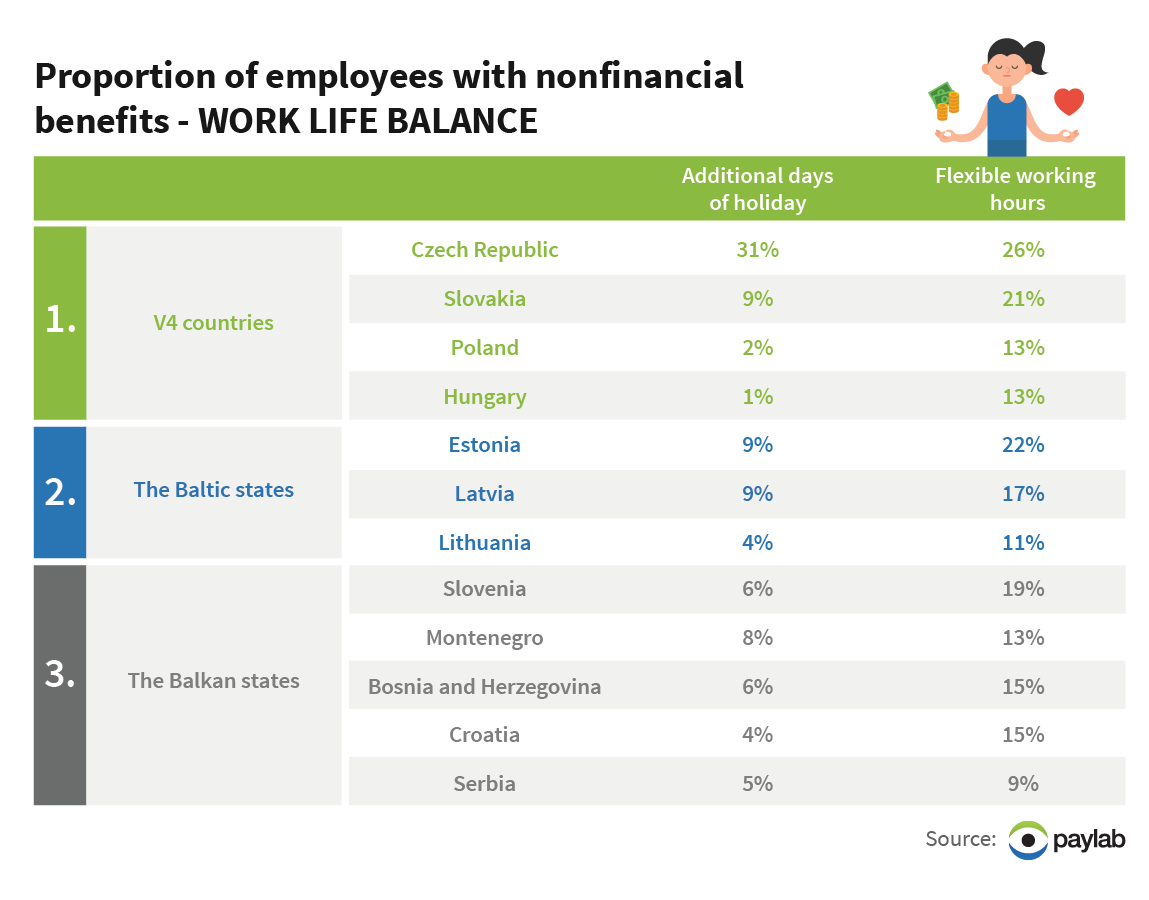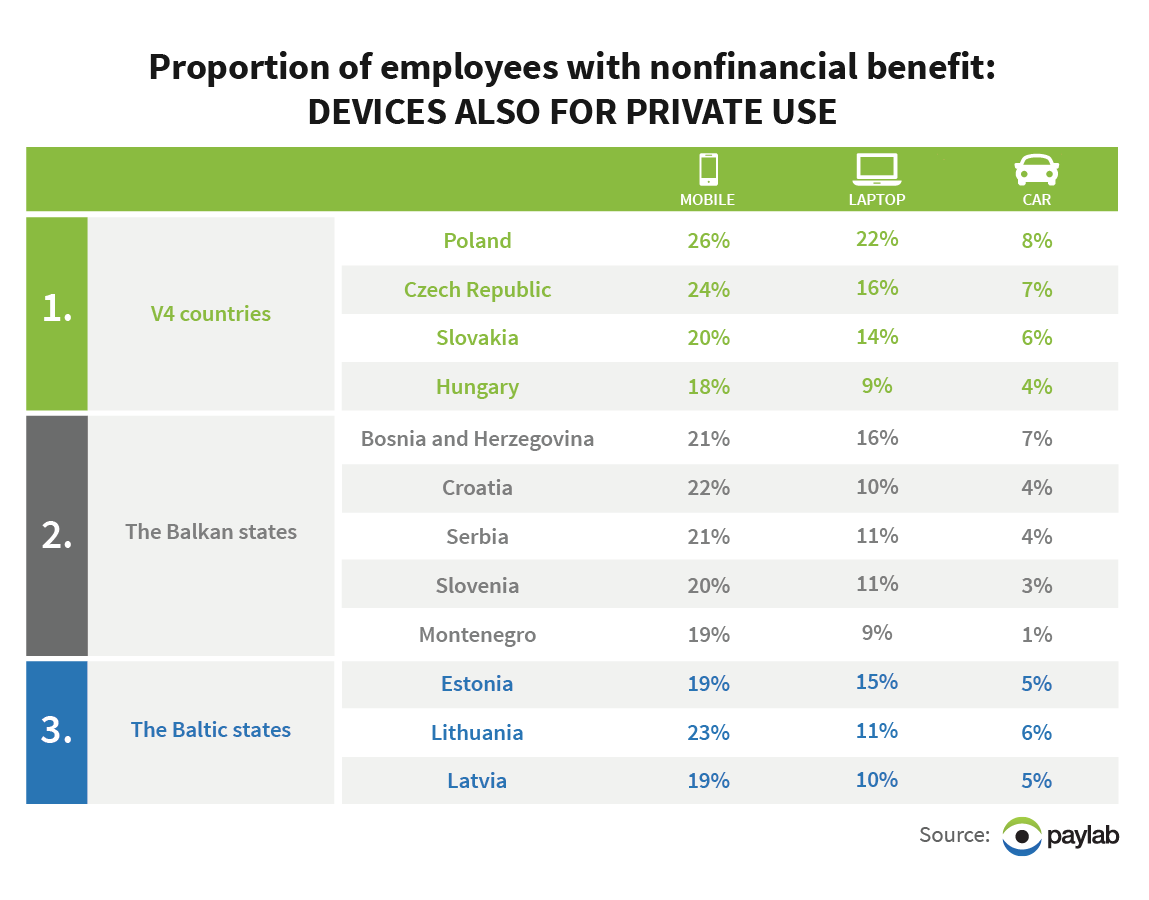Paylab decided to map the trends currently going on in the world of non-financial benefits. Employers are forced to largely and quickly adapt to modern times and people’s needs in the 21st century. Work is an integral part of lifestyle, and in many cases privacy is largely connected with one’s job. Some employee benefits try to tear down workplace stereotypes and guarantee assistance and convenience.
Today, companies try to meet employee’s expectations beyond their regular salaries, as employees are honored with non-financial benefits. Some of them are taken as a given, e.g. beverages and fresh fruit in the workplace, not to mention a phone and laptop for private use. Some, however, really reduce employee turnover, and thanks to these benefits employees are able to move forward with better motivation for time management, more exercise and relaxation and learning something new. Non-financial benefits bring many advantages, conveniences and smiles as they offer support and comfort in real time.
Balanced private life – balanced work life
The working environment is becoming more unconventional and it is quite common nowadays to arrange work phone calls and emails from the cafeteria or playground. Recently, the most awarded benefits comprise work-life balance solutions – that means flexible working hours, work from home or reimbursed sick days to recover without having to see a doctor. Certainly, each employee acknowledges that the standard number of holidays is not enough to cover everything that an ordinary person would like to do during the year. Due to a growing need to pay full attention to the family or to hobbies and interests, paid leave beyond the framework of the law is an especially popular benefit. These days, companies commonly offer from 2 to 5 extra days of vacation each, eventually including birthday leave and an extra day off for busy fathers. Compare your salary and benefits for the specific position in your country on Paylab.

Some companies provide individual benefits in the form of various compromises for employees who have already served in the company for several years and are crucial to the company’s operations. When managers are feeling burnt out, companies may offer them a sabbatical – a longer vacation to rejuvenate, to get new energy and enthusiasm. Remote work is an interesting offer as well – when an employee can work remotely for a certain period, during which he or she can be free travel. Something called a workation – a business trip abroad combined with a holiday – is also an attractive option. Thus, in addition to managing business issues, employees have a larger opportunity to get to know the city or to take a partner along for the journey.
Another interesting benefit is the option to work 4 days a week, as well as reimbursement for home help services (cleaning, caring for the elderly, child care). In some companies, we can also find Volunteer hours, time reserved for volunteer work, or Pet hours – time reserved for walking a dog, for example.

Some employers also have an Employee Assistance Program – where advice on business, personal, legal and other problems are offered to employees. A relocation bonus is offered to candidates from more remote areas for moving to company headquarters in the city. During the holidays, when parents are looking for a meaningful program for their children, some companies organize a corporate kids’ camp for the children of employees.
Employees are growing alongside the company
Another valuable benefit is education and personal development. Employees have a feeling of undergoing constant development, which is enormously important – especially for the millennials. Companies reimburse employees for professional literature and invest in professional conferences, training and internal workshops. Employees from international companies have the opportunity to go to branches abroad as interns. Some companies have their own corporate coaches who train employees on soft and hard skills, or they serve as mentors for personal development and inner balance.
Healthcare, wellness and relaxation
Why would employees have to chase after services, when the services can come to them? For example, a masseur, cosmetician, personal trainer, nutritionist, physiotherapist, chiropractor, chef, doctor or specialist? Companies contribute their employees’ sporting and cultural activities, support them in setting up sports teams, and even provide them with regular vision exams. How about a pleasant stay in a corporate family house or cottage somewhere in an attractive tourist area?
The population of employees is aging and getting older, so it is necessary to think about their health and prevention soon enough. Companies contribute to above-standard medical care, including innovative diagnosis and second opinion programs, which enables their workers to receive comments from other specialists about their health problems. Some employers go further – for example, female employees at Facebook have the opportunity to freeze their eggs, avoiding the pressure of their biological clock and postponing parenthood for a period when she’s found the right partner.

Benefits for a safe future
Some non-financial benefits are linked to the future and operate on the feeling of security and good prospects – benefits from which the employee will be benefit later on, when they really need it. We are talking here about Retirement and Life Insurance, Long Term Disability Insurance, and Added Health Insurance. Employees at some companies can buy shares and take advantage of various investment programs.
Many companies also strongly follow a Green Policy, enabling employees to commute to work by bike and reimbursing employees for public transport tickets and a large part of the costs of buying a bike and ecological home appliances, as shown by the company Swiss Re.

Non-financial benefits are also a means to create and communicate a real corporate culture and transfer corporate values into practice. Thanks to their great experience from company benefits, employees and their relatives can see their employer in a more positive light and become devoted advocates. This way, employers invest into the loyalty of their team, because thanks to the opportunities brought about by these nonfinancial benefits, stronger bonds are created between employees. A good example of this dynamic are various company events. Paylab has information about salaries and proportion of existing incentive bonuses which employers provide for employees in the specific area.






